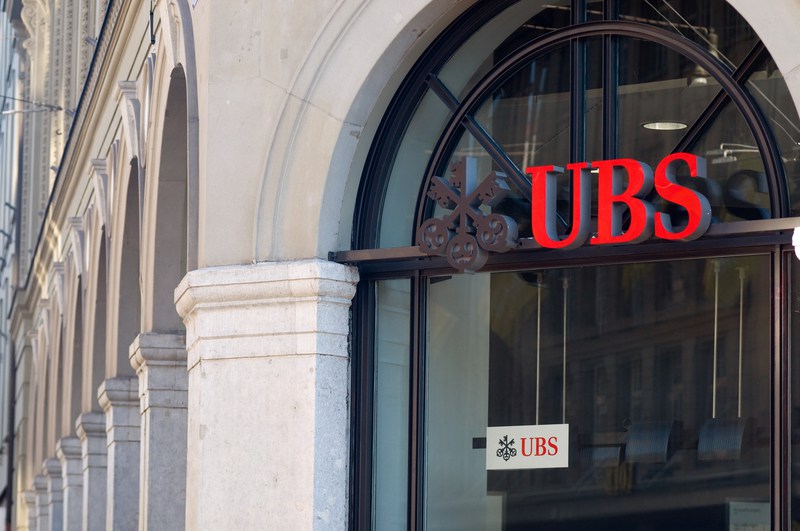Investec Switzerland. UBS’s results are a reminder that even the strongest boats are being buffeted by the storm in financial markets. Tuesday’s slump in profit from both investment banking and wealth management sent the shares to the lowest in a year. It also puts in question the premium valuation the bank has enjoyed over its peers. The Swiss bank has been the model for European firms looking to reinvent themselves after the financial crisis — it moved decisively in 2012 to pare back much of its fixed income business to focus on wealth management. That’s allowed it to build capital and hold out the prospect of bigger dividends. © Simon Zenger | Dreamstime.com Investors rewarded it: the shares have returned 13 percent in the past three years, compared with 4 percent loss for its peers. The stock trades at an 18 percent premium to tangible book value, compared with a peer group that trades at a 2 percent discount. But investors saw straight through the better-than-expected net income figure in Tuesday’s quarterly results and even the promise of a special dividend. Wealth management, the lodestar of CEO Sergio Ermotti’s strategy, was the big disappointment: operating income fell to the lowest in two years, while the unit saw net outflows for the first time in at least that long.
Topics:
Investec considers the following as important: Bad quarter for UBS, Business & Economy, Investec Switzerland, UBS, UBS results
This could be interesting, too:
investrends.ch writes Geteiltes Bild: Industrie schwächelt, Dienstleister im Aufwind
investrends.ch writes Zürcher Regierung befürchtet Einbussen im Falle eines UBS-Wegzugs
investrends.ch writes Libor-Skandal: Zwölf Jahre Ermittlungen, 237 Millionen Franken Bussen – die WEKO zieht Bilanz
investrends.ch writes Parlamentariergruppe legt Kompromiss zu UBS-Kapitalregeln vor
UBS’s results are a reminder that even the strongest boats are being buffeted by the storm in financial markets.
Tuesday’s slump in profit from both investment banking and wealth management sent the shares to the lowest in a year. It also puts in question the premium valuation the bank has enjoyed over its peers. The Swiss bank has been the model for European firms looking to reinvent themselves after the financial crisis — it moved decisively in 2012 to pare back much of its fixed income business to focus on wealth management. That’s allowed it to build capital and hold out the prospect of bigger dividends.

© Simon Zenger | Dreamstime.com
Investors rewarded it: the shares have returned 13 percent in the past three years, compared with 4 percent loss for its peers. The stock trades at an 18 percent premium to tangible book value, compared with a peer group that trades at a 2 percent discount. But investors saw straight through the better-than-expected net income figure in Tuesday’s quarterly results and even the promise of a special dividend. Wealth management, the lodestar of CEO Sergio Ermotti’s strategy, was the big disappointment: operating income fell to the lowest in two years, while the unit saw net outflows for the first time in at least that long. UBS blamed lower client activity in Asia and emerging markets, two regions that are sending shock waves through financial markets right now. Executives told analysts wealthy investors haven’t been this spooked since the 2008 crisis.
It’s not a UBS-specific problem. Julius Baer’s latest earnings showed signs of a slowdown in wealth management. It also bodes badly for Credit Suisse’s earnings later this week.
Investment banking, which UBS has been shrinking in favour of wealth management, offered little comfort either. The bank’s focus on equities had been expected to be a bright spot, but that business saw a 19 percent drop in revenue year-on-year — worse than U.S. rivals and almost as bad as Deutsche Bank.
Yet UBS still has a lot going for it in terms of capital cushion and dividend potential, two of the biggest drivers of bank valuations. UBS’s core Tier 1 capital ratio under Basel III stood at 14.5 percent, up from the third quarter and above most European peers. UBS said it’s committed to paying out 50 percent of profit in dividends, as long as its capital ratio is at least 13%, so the bank has some room for maneuver.
The shares imply a dividend yield of 7.2 percent based on next year’s estimated earnings, more than the sector average of
6.5 percent.
Analysts have predicted UBS will deliver faster revenue growth than European competitors over the past three years.
Those expectations look too optimistic today.
But even if UBS’s valuation does take a dent, the bank’s restructuring is still delivering and it should find it easier to reward investors than its battered peer group.
This column does not necessarily reflect the opinion of Bloomberg LP and its owners.
By Lionel Laurent, Bloomberg.
